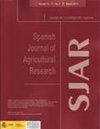专家关于在地中海集约园艺中可持续使用杀线虫剂的意见
IF 0.8
4区 农林科学
Q3 AGRICULTURE, MULTIDISCIPLINARY
引用次数: 0
摘要
研究目的:根结线虫被认为是园艺作物获得优质和经济上可行产量的常见限制因素。农药熏蒸剂土壤消毒一直是主要的线虫控制方法,直到最近由于环境和社会问题而被禁止。本文探讨了农民和农业顾问对可持续利用现有线虫控制方法的意见和偏好,认为可持续性是杀线虫效果、减少环境有害影响和保护人类健康的综合。研究领域:本研究在西班牙南部集约化园艺作物地区的农场顾问之间进行。材料和方法:通过意见调查和层次分析法对农场顾问对杀线虫剂使用的意见和偏好进行评价。所做的分析是探索性的。主要结果:鉴于目前可用的控制方法具有足够的杀线虫效果以获得有利可图的产量,农场顾问小组对在集约化园艺作物中使用可持续的替代方法进行线虫控制表现出了极大的意识,优先考虑生物日光作为第一选择,其次是生物农药和熏蒸杀线虫剂。使用高毒性的臭氧和非熏蒸型杀线虫剂被认为是最后的选择,但具有较低生态毒性的新一代杀线虫剂也被认为是可持续线虫管理的重要工具。研究重点:这些结果预测了欧盟在禁止使用农用化学熏蒸剂时,农民对可持续使用杀线虫剂的反应。本文章由计算机程序翻译,如有差异,请以英文原文为准。
Experts’ opinion on the sustainable use of nematicides in Mediterranean intensive horticulture
Aim of study: Root-knot nematodes are considered a common limiting factor to reaching premium quality and economically viable yields in horticultural crops. Soil disinfestation with agrochemical fumigants has been the main nematode control method until their recent ban due to environmental and social concerns. This paper explores farmers and agricultural advisors’ opinion and preferences on the sustainable use of available nematode control methods, considering sustainability as an integration of nematicidal effectiveness, reduction of environmental harmful effects and preservation of human health.
Area of study: This study has been carried out between farm advisors of intensive horticultural crop areas in Southern Spain.
Material and methods: Farm advisors’ opinion and preferences on the use of nematicides was evaluated following an opinion survey and the Analytic Hierarchy Process (AHP) method. The analysis done was exploratory.
Main results: Providing that current available control methods give enough nematicidal effectiveness to get a profitable yield, the group of farm advisors showed a great consciousness on the use of sustainable alternatives for nematode control in intensive horticultural crops, prioritizing biosolarization as the first option, followed by biopesticides and fumigant nematicides in third place. The use of ozone and non-fumigant nematicides with high toxicity profiles were considered the last options, but new generation nematicides with lower ecotoxicity profiles are also considered as an important tool in sustainable nematode management.
Research highlights: These results provide a prediction of farmers' responses to the sustainable use of nematicides promoted by the European Union when agrochemical fumigants are banned.
求助全文
通过发布文献求助,成功后即可免费获取论文全文。
去求助
来源期刊

Spanish Journal of Agricultural Research
农林科学-农业综合
CiteScore
2.00
自引率
0.00%
发文量
60
审稿时长
6 months
期刊介绍:
The Spanish Journal of Agricultural Research (SJAR) is a quarterly international journal that accepts research articles, reviews and short communications of content related to agriculture. Research articles and short communications must report original work not previously published in any language and not under consideration for publication elsewhere.
The main aim of SJAR is to publish papers that report research findings on the following topics: agricultural economics; agricultural engineering; agricultural environment and ecology; animal breeding, genetics and reproduction; animal health and welfare; animal production; plant breeding, genetics and genetic resources; plant physiology; plant production (field and horticultural crops); plant protection; soil science; and water management.
 求助内容:
求助内容: 应助结果提醒方式:
应助结果提醒方式:


